Diplomatic Bluebook 2025
Chapter 4
Japan's Diplomacy Open to the Public
Section 3 Diplomacy with the Support of the Public
1 Proactive Communications to the Public
(1) Overview
Public understanding and support are indispensable for the smooth implementation of Japan's foreign policy. As such, providing prompt and clear explanations on the policy details and on the role of the government is crucial. Accordingly, the Ministry of Foreign Affairs (MOFA) is making efforts in timely and effective public relations, using various forms of media, lectures, publications, and others.
(2) Providing Information Through Domestic Media
MOFA has committed itself to promptly and accurately providing information through various media, such as newspapers, television, and the Internet, in order to gain the understanding and support of Japanese nationals for Japan's foreign policy. Specifically, regular press conferences are conducted by the Foreign Minister and the Press Secretary, while extraordinary press conferences are held as necessary. Press conferences by the Foreign Minister are live-streamed on the official MOFA YouTube channel, with the records and video of them published on MOFA's website. During foreign visits by the Prime Minister or the Foreign Minister, MOFA provides information from visiting countries/regions via multiple means, including social media, so that people can promptly follow and understand the purposes and the outcomes of the visits.
MOFA also regularly releases statements by the Foreign Minister or Press Secretary on individual international issues, expressing the position of the Government of Japan. Similarly, MOFA frequently provides press releases on its daily diplomatic activities and other topics. Additionally, the Minister and State Ministers for Foreign Affairs explain the Government's foreign policies directly to the public through appearances on various media and interviews.
 Press Conference by Foreign Minister Iwaya (October 2, Tokyo)
Press Conference by Foreign Minister Iwaya (October 2, Tokyo)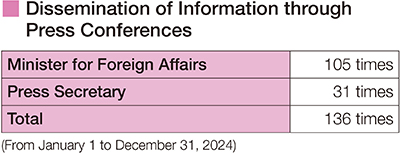
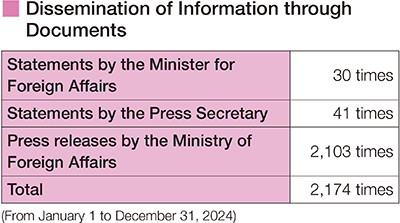
(3) Information Provision to the Public Through the Internet
MOFA's website (in Japanese and English) promptly provides information on the diplomatic activities of the Prime Minister and the Foreign Minister as well as on Japan's foreign policy including territory/sovereignty, recognition of history, and security, along with the latest international relations and other basic relevant information.
MOFA's website in the Japanese language provides a variety of contents for Japanese nationals across a wide range of age groups, including “MOFA for Kids,” the “Anything Report from Around the World,” “Easy Ways to Understand International Situations,” and so on. In particular, “MOFA for Kids” creates and publishes a wide range of contents for children such as videos featuring MOFA officials to explain MOFA's activities in an easy-to-understand way, national flag quizzes, and Q&A corners explaining vocabulary and international issues that are covered frequently in the news and newspapers. Moreover, new explanatory articles, etc. were added to “Easy Ways to Understand International Situations” building on the opportunities presented by the 60th anniversary of Japan joining the Organisation for Economic Co-operation and Development (OECD), as well as The 10th Pacific Islands Leaders Meeting (PALM10) held in Tokyo.
In addition to the above, MOFA provides a variety of information through various social media platforms. In 2024, MOFA actively provided information about topics such as diplomatic events both within Japan and abroad, the situation in Ukraine, the situation in the Gaza Strip, and ALPS treated water.(1)
 MOFA's official website: https://www.mofa.go.jp/index.html
MOFA's official website: https://www.mofa.go.jp/index.html MOFA for Kids
MOFA for Kids MOFA's official X account: https://x.com/MofaJapan_en
MOFA's official X account: https://x.com/MofaJapan_en MOFA's official website
MOFA's official website MOFA's official X account
MOFA's official X account MOFA's official Facebook account
MOFA's official Facebook account MOFA's official Instagram account
MOFA's official Instagram account- (1) ALPS treated water is water which is processed by devices such as ALPS (Advanced Liquid Processing System) to ensure that the radioactive materials other than tritium surely meet the regulatory standards for safety. ALPS treated water is then sufficiently diluted so that the concentrations of the radioactive materials including tritium is far below the regulatory standards for safety, and then finally discharged into the sea.
(4) Dialogue with Japanese Nationals
With the notion of “Public Relations through Dialogue with the People,” MOFA promotes direct dialogue between the people and MOFA officials.
“Dialogue with Students,” an event for direct engagement with university students, was held at MOFA in February. Lively discussions were held on topics such as Japan's development cooperation policy, building on the milestone of the 70th anniversary of Japan's Official Development Assistance (ODA). In addition, in November MOFA and Tohoku University co-hosted another “Dialogue with Students” with university students from the Tohoku region on topics such as “The United Nations and Japan's Cooperation on Disaster Risk Reduction,” based on the Sendai Framework for Disaster Risk Reduction 2015-2030. At the “Children's Kasumigaseki Tour Day” held in August, MOFA ran a variety of programs for participants including talks and children's press conference to deepen understanding about MOFA's work and countries around the world.
 Children's press conference at “Children's Kasumigaseki Tour Day” (August 8, MOFA)
Children's press conference at “Children's Kasumigaseki Tour Day” (August 8, MOFA)Various programs in which MOFA sends its officials to venues such as local government offices, international exchange organizations, universities and high schools throughout Japan, as well as the one in which elementary, junior, and senior high school students visit MOFA were conducted both online and in person at the request of the participating schools and organizations. These included “Lectures on the International Situations,” “Diplomatic Talks,” “Talks for High School,” and “Visits by Elementary, Junior and Senior High School Students to MOFA.”
Through these programs, MOFA promotes better understanding of foreign policy and international affairs among young people, who will bear the future of Japan on their shoulders.
 Visit by Dalton Tokyo Junior & Senior High School to MOFA as part of “Visits by Elementary, Junior and Senior High School Students to MOFA” (July 11, MOFA)
Visit by Dalton Tokyo Junior & Senior High School to MOFA as part of “Visits by Elementary, Junior and Senior High School Students to MOFA” (July 11, MOFA) Lecture on Japan's foreign policy as part of “Diplomatic Talks” (July 5, Meijo University)
Lecture on Japan's foreign policy as part of “Diplomatic Talks” (July 5, Meijo University)MOFA officials also give “ODA Delivery Lectures” on Japan's Official Development Assistance (ODA) policies and specific measures of ODA to numerous schools via online. Additionally, MOFA publishes the periodical journal “Diplomacy,” widely sharing information on the current international affairs relevant to Japan and discussions on diplomacy taking place in various areas at various levels. In 2024, the journal took up a range of diplomatic challenges as topics that offered an overview of the current international situation, examining Russia's aggression against Ukraine, the situation in the Gaza Strip, presidential and general elections around the world, such as the U.S. presidential election, and their impact on the region and the world from multifaceted viewpoints. The journal featured a large number of essays and other articles from renowned experts both inside and outside Japan.
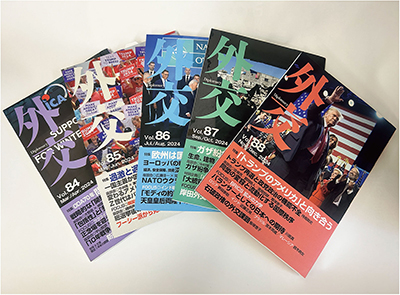 Periodical journal “Diplomacy”
Periodical journal “Diplomacy”Moreover, MOFA also produced various pamphlets aimed at a broad readership in order to promote a deeper understanding on the organization and Japanese diplomacy, such as ALPS treated water. In addition to the above, MOFA hears comments and opinions from the public through its website. Comments and opinions from the public are accordingly shared within MOFA and used as a reference in policy making and planning.
(5) Promotion of the Declassification of Diplomatic Records and Access to Information
To further enhance the public understanding of and confidence in Japan's foreign policy, MOFA is actively engaging in the declassification of records and in efforts to facilitate greater convenience in the public use of diplomatic documents. Since 1976, MOFA has declassified its postwar diplomatic records over time as a voluntary initiative. The Rules on the Declassification of Diplomatic Records, which were established in 2010, stipulate: (a) the declassification of diplomatic documents created or obtained more than 30 years ago in principle, and (b) the establishment of the “Committee for the Promotion of the Declassification of the Diplomatic Records,” which is chaired by the State Minister for Foreign Affairs or the Parliamentary Vice-Minister for Foreign Affairs as well as attended by external experts, to further promote the declassification of diplomatic records and improve its transparency. The number of files that have been transferred to the Diplomatic Archives and made public since then reached approximately 39,000 by the end of 2024. Furthermore, MOFA has disclosed information pursuant to the Act on Access to Information Held by Administrative Organs, while giving consideration to national security, the relationship of mutual trust with other countries, the impact on diplomatic negotiations, and the protection of personal information. In 2024, MOFA received 593 requests for disclosure, and documents totaling 82,549 pages were disclosed.
Holding around 120,000 diplomatic documents including 40,000 from the pre-war period, MOFA's Diplomatic Archives are specified as “the National Archives of Japan, etc.” under the Public Records and Archives Management Act (Archives Management Act). The Archives respond to viewing and usage requests, answer inquiries regarding documents in the collection and diplomatic history, and display materials in the collection. In addition, the Archive has compiled important diplomatic documents since 1868 by theme and published them in succession as the “Documents on Japanese Foreign Policy,” and since 1988 has also published an annual report.
“I was nervous because I thought diplomacy is really weighty, but the seminar was fun, and I was able to relate to diplomacy! So much of it was new to me, and the image I had of diplomats changed!”
These comments are feedback from participants of the event “Dialogue with Students.” Aimed at deepening interest and understanding in Japan's foreign policy and the international situation among the young generation of Japanese who will be leaders in the future, “Dialogue with Students” is typically held twice a year for undergraduate and graduate school university students.
 “Dialogue with Students” poster
“Dialogue with Students” posterMade up of a lecture-style session involving all participants and multiple Small-Group Sessions, “Dialogue with Students” is an interactive event in which Ministry of Foreign Affairs (MOFA) officials provide explanations about Japan's foreign policy and then engage with students through Q&A and discussion sessions. A notable feature is the timeliness it brings to foreign policy by taking into consideration international conferences and anniversaries occurring that year. “Dialogue with Students” also showcases the Diplomatic Bluebook, the periodical journal “Diplomacy” and other materials to help deepen students' learning.
■The session of the first “Conversations with MOFA Officials” in four years was a big success!
Held at MOFA in February, a total of 165 students participated in “Dialogue with Students” both in person and online. The lecture-style session involving all participants featured a keynote speech on the topic of the “Rapidly Changing International Situation and Japanese Diplomacy” as well as a speech on “Experiences by Young MOFA Officials.” The students passionately listened to these speeches blending real experiences which do not appear in the news. The Small-Group Sessions addressed three topics, all of which saw lively discussions: “United Nations Diplomacy,” linked to the Summit of the Future held at the UN in September, “Development Cooperation Policy,” building on the 70th anniversary of Japan's Official Development Assistance (ODA) in 2024, and “Security Policy,” under the new National Security Strategy adopted at the end of 2022.
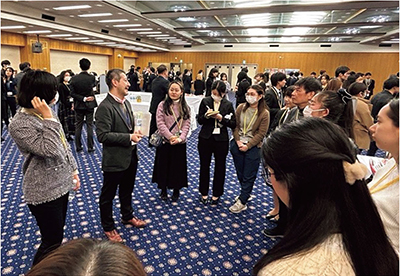 Students gathered in passionate discussion with MOFA officials during the informal conversation session (February 8, MOFA, Tokyo)
Students gathered in passionate discussion with MOFA officials during the informal conversation session (February 8, MOFA, Tokyo)After the Small-Group Sessions, “Conversations with MOFA Officials” was also held. Students made comments such as “I was able to hear first-hand from MOFA officials specializing in a range of fields and languages about what I wanted to know.” The close interaction between participants and presenters is one of the attractions of this event.
■Held in the Tohoku region in November for the first time!
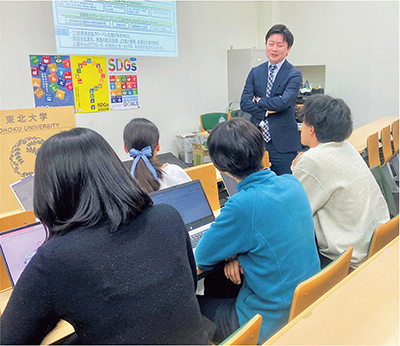 Students in discussion with the facilitator (MOFA official) in a Small-Group Session (November 6, Tohoku University, Miyagi Prefecture)
Students in discussion with the facilitator (MOFA official) in a Small-Group Session (November 6, Tohoku University, Miyagi Prefecture)“Dialogue with Students” was held at Tohoku University (Sendai City, Miyagi Prefecture) in November, attracting 101 students, mainly from the Tohoku region. To date, the event had been held in Osaka and Nagoya as well as Tokyo, but this was the first session in Sendai, the Tohoku region.
On the topic of “Japan's Foreign Policy and the International Community at Turning Point in History,” the keynote speech provided an overview of the recent international situation as well as explained trends and issues in public diplomacy, followed by a lively Q&A session. The subsequent Small-Group Sessions engaged in three topics, each of which saw lively discussions among small numbers of participants: “The United Nations and Japan's Cooperation on Disaster Risk Reduction” based on the Sendai Framework for Disaster Risk Reduction 2015-2030 adopted at the Third UN World Conference on Disaster Risk Reduction in 2015; “Youth, Business and Africa,” looking ahead to the Ninth Tokyo International Conference on African Development (TICAD 9) to be held in Yokohama in August 2025; and “International Law and Japanese Diplomacy,” oriented toward peace through the rule of law. A student who participated in the session about “The UN and Japan's Cooperation on Disaster Risk Reduction” commented that “learning about the Sendai Framework helped me appreciate more how our home region is linked to the world.” This feedback showed how their understanding of diplomacy was deepened through picking up topics tailored for the event's venue, the Tohoku region.
“Dialogue with Students” is also a great encouragement for MOFA officials. MOFA plans to continue placing emphasis on engagement with the younger generation, holding events with even better content to further deepen their understanding of diplomacy. MOFA looks forward to seeing many more students participate in the future!
■Opening of the New Exhibition Room
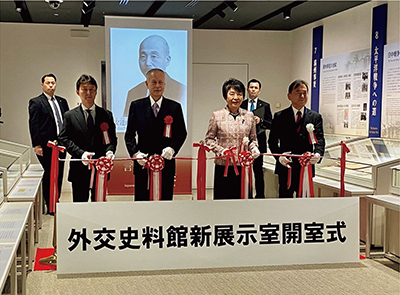 Foreign Minister Kamikawa cutting the ribbon at the Opening Ceremony (April 5, at the new Exhibition Room of the Diplomatic Archives, Tokyo)
Foreign Minister Kamikawa cutting the ribbon at the Opening Ceremony (April 5, at the new Exhibition Room of the Diplomatic Archives, Tokyo)On April 5, the Exhibition Room of the Diplomatic Archives of the Ministry of Foreign Affairs moved to the fifth floor of the Azabudai Hills Mori JP Tower and reopened. At the Opening Ceremony, Foreign Minister Kamikawa commented that “I expect that the new Exhibition Room will become a place where everyone can stop by anytime and further familiarize themselves with Japan's diplomacy.” The Ceremony was featured in many media outlets, and by early September more than 10,000 people had visited since the opening to the public on April 8.
■Significance and Features of the New Exhibition Room
Located in Azabudai Hills, a new landmark district in Tokyo, the new Exhibition Room is designed to welcome a large number of visitors. Being accessible to many guests of diverse age groups is critical to fulfilling the mission of the Diplomatic Archives.
The new Exhibition Room showcases the history of Japan's diplomacy from the final days of the Tokugawa Shogunate to the present day in an easy-to-understand format. The Permanent Exhibition Room displays diplomatic documents such as major treaties in chronological order, with quotes from successive foreign ministers and diplomats displayed on screens. Differences with the previous exhibits include now also displaying treaties from the 1970s onward and presenting diplomatic activities until the present day. In addition, panels and video displays explaining their historical background have been enhanced, all designed to pique visitors' interest. The panels also include explanations in English to make them more accessible to visitors from overseas. Furthermore, the Special Exhibition Room displays materials related to Prime Minister YOSHIDA Shigeru at the time of acceptance of the San Francisco Peace Treaty, and SUGIHARA Chiune, who as a diplomat stationed in Lithuania issued “Visas for Life” to Jewish refugees.
■Future Issues and Initiatives
A range of initiatives are being taken regarding the new Exhibition Room to make it attractive to a larger number of visitors. Particular effort is being put into educational assistance, through working to link with school education such as by displaying major treaties listed in history textbooks. Group visits from elementary, junior, and senior high schools ─ including school trips and social studies field trips ─ are actively welcomed, and mini lectures are also provided. Effort is also being put into information provision to spark the curiosity of even people who do not usually have much interest in diplomacy or history.
 Treaty of Commerce and Navigation between Japan and the U.K. (instrument of ratification)
Treaty of Commerce and Navigation between Japan and the U.K. (instrument of ratification)The Diplomatic Archives also hosts featured exhibitions and special exhibitions. In 2024, the Special Exhibition: “Treaty of Commerce and Navigation between Japan and the U.K. ─ MUTSU Munemitsu and Treaty Revision ─” displayed original treaty-related documents to mark the 130th anniversary of the signing of this Treaty. In addition, the exhibition “Relations between Greece and Japan through Diplomatic Documents” was co-hosted with the Embassy of Greece in Tokyo to commemorate the 125th anniversary of the establishment of formal relations between Japan and Greece as well as the “Year of Culture and Tourism Between Japan and Greece.” The Diplomatic Archives plans to continue holding more attractive exhibitions, including those of original documents.
■History and Role of the Diplomatic Archives
The story of the Diplomatic Archives began when it was first opened in April 1971. Since then, this independent initiative of MOFA has preserved and managed documents and records which are valuable parts of Japan's diplomatic history. The Diplomatic Archives also compiles the “Documents on Japanese Foreign Policy (Nihongaikobunsho),” which have been published since 1936 by MOFA. In 1988, the Annex including the Exhibition Room was built thanks to a donation from the Yoshida Shigeru Memorial Foundation. However, the aging building and its inconvenient location led to the relocation to Azabudai Hills. Based on the Public Records and Archives Management Act, since 2011 the Diplomatic Archives accordingly preserves diplomatic documents in perpetuity as “an intellectual resource to be shared by the people in supporting the basis of sound democracy,” and provides them for the use of the Japanese people.


